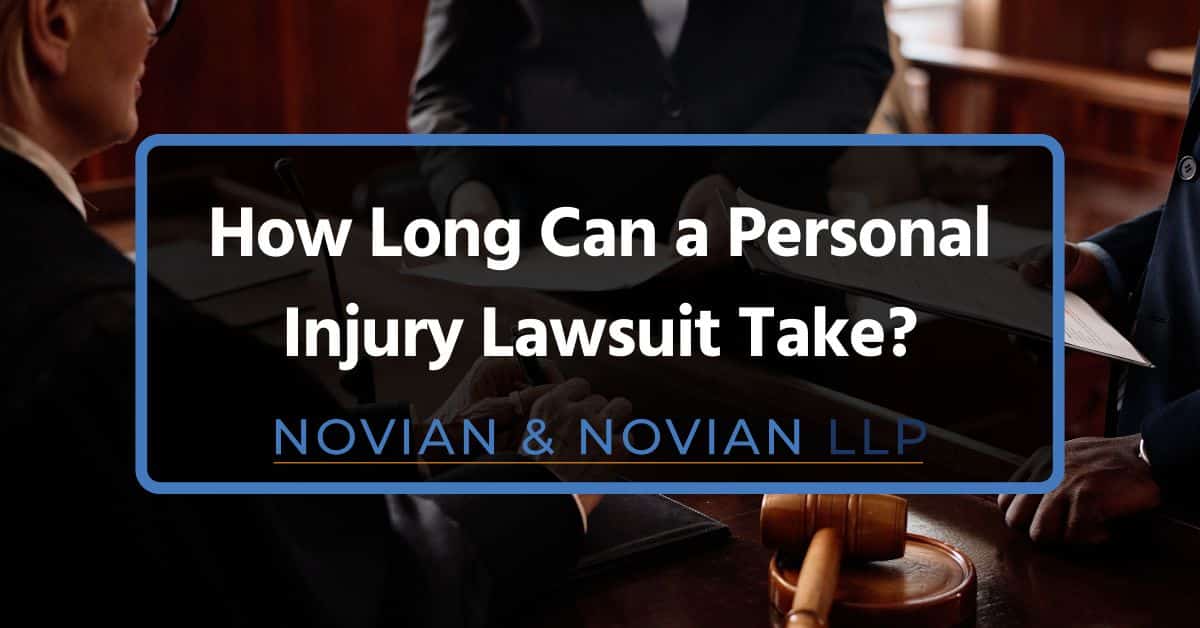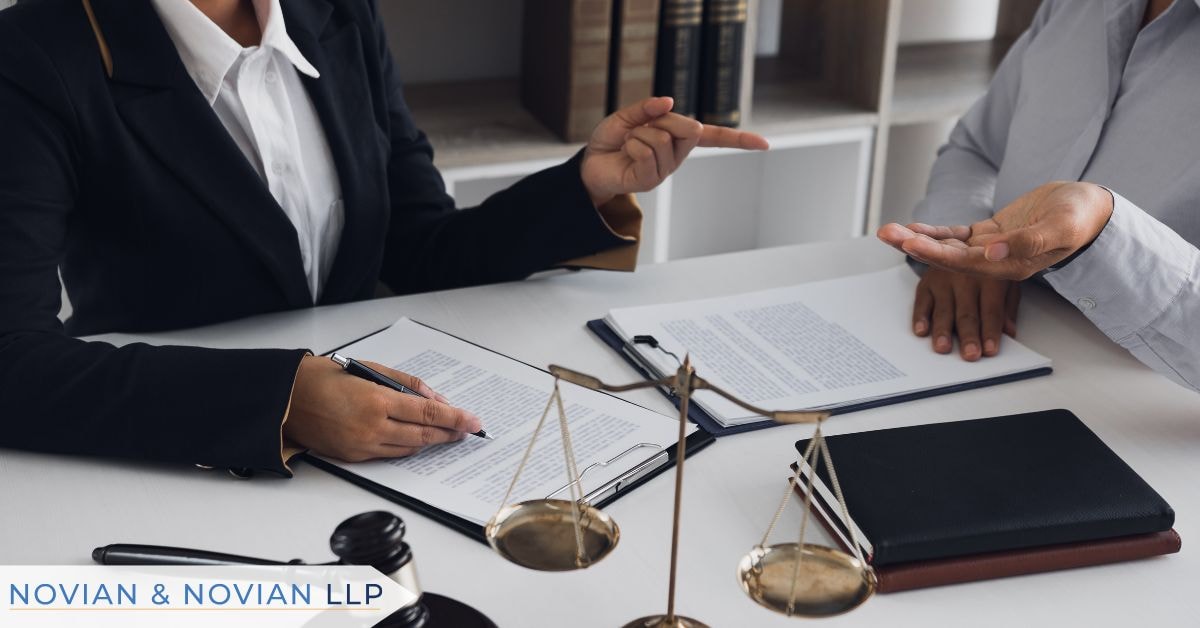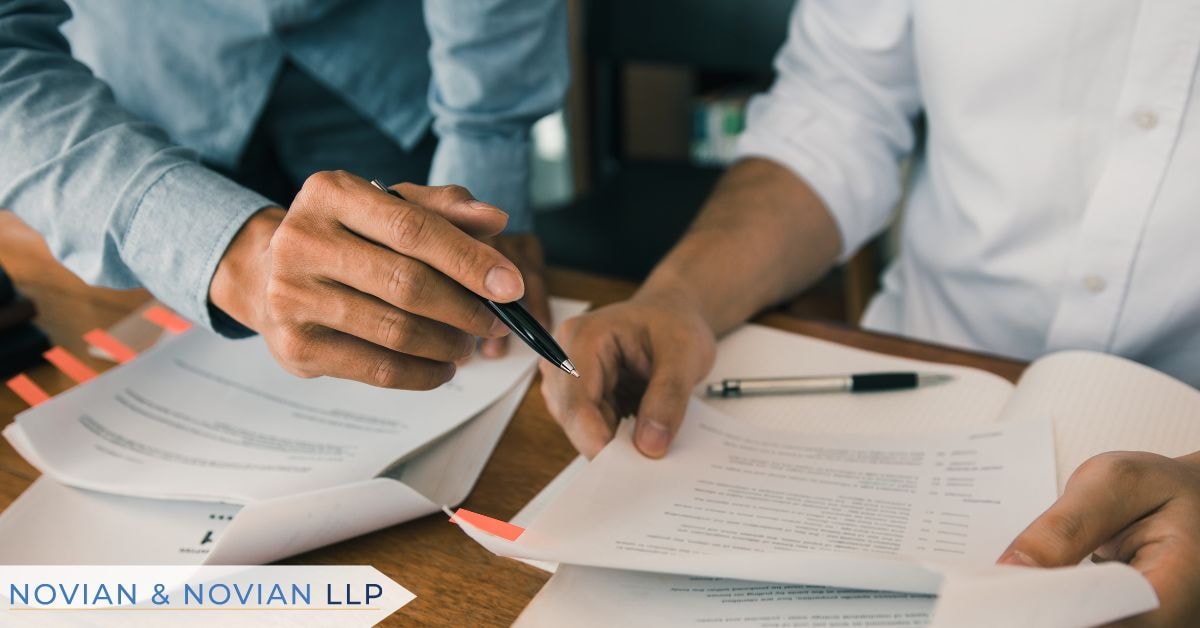
By | Oct 31, 2024 | Catastrophic Injury
Personal injury lawsuits are legal claims filed when someone is injured due to another party’s negligence. The duration of a personal injury lawsuit can vary greatly, depending on several factors such as case complexity, medical recovery time, willingness to settle, court schedules, etc.
In general, a personal injury lawsuit can take anywhere from a few months to several years. Some cases settle quickly through negotiations, while others may require a trial, adding more time to the process.
If you are dealing with a personal injury in California and want to understand your legal options, it is best to have experienced attorneys on your side. At Novian & Novian, we specialize in handling numerous cases, including personal injury and catastrophic injury cases. We are here to help you navigate the process and ensure you receive the compensation you deserve as soon as possible. Reach out to us now for a free case evaluation.
In this post, we will cover the stages of a personal injury claim and how long each step takes. We will also talk about how settlements differ from trials and tips for speeding up a personal injury lawsuit process.
How Long Can a Personal Injury Lawsuit Take?
The timeline for personal injury lawsuits can vary depending on the type of case and the complexity of the circumstances. While some cases may settle in a few months, others can take several years to resolve.
Here’s an overview of average timeframes for different types of personal injury cases:
Car Accident Cases: Car accident cases are among the most common personal injury claims. On average, these cases can take anywhere from 6 months to 2 years to resolve, depending on the severity of the injuries and whether the insurance company disputes liability. If liability is clear and the injuries are minor, settlements may happen faster. However, cases involving serious injuries or disputes about fault may require more time.
Slip and Fall Cases: Slip and fall cases typically take 1 to 2 years to settle. Since these cases often involve disputes about property maintenance and negligence, gathering evidence, medical records, and negotiating with insurance companies can take time.
Medical Malpractice Cases: Medical malpractice lawsuits are often very complex and can take 2 to 4 years or even longer as they require expert testimony, a thorough investigation of medical records, and a deep dive into the standard of care.
Product Liability Cases: Product liability cases typically involve injuries caused by defective products and can take 1 to 3 years. These lawsuits often require technical investigations and expert analysis, making them lengthier than simple negligence cases.
Motorcycle Accident Cases: Motorcycle accident cases are usually resolved within 12 to 24 months, but this can vary based on the complexity of the injuries.
Workplace Injury Cases: Workplace injury lawsuits, like workers’ compensation claims, can take 6 months to 2 years. Many factors, such as whether the injury was caused by third-party negligence or employer fault, will affect the timeline and determine the exact number of years it would take.
Dog Bite Cases: Dog bite cases generally take 6 months to 18 months to settle, depending on the severity of the injuries and the liability of the dog owner. In some cases, the process can be expedited if liability is clearly established.
Wrongful Death Cases: Wrongful death lawsuits are often the most emotional and complex cases to tackle. These cases can take 1 to 3 years to resolve, especially when proving liability and calculating damages for the loss of a loved one. The timeline can also be extended if multiple parties are involved or if significant investigations are needed.
The Stages of a Personal Injury Claim and How Long Each Takes
Personal injury claims take time due to the complexity of legal procedures and the need to gather evidence thoroughly. Each stage of a personal injury case, from negotiations to trial, has its own timeline. Typically, factors such as the severity of the injury, the involvement of the insurance company, and the legal process itself can influence how long the case takes.
Let’s break down the stages and how long each can last:
Pre-Lawsuit Negotiations
Before filing a lawsuit, parties often try to settle through negotiations with the insurance company. This phase can involve back-and-forth settlement discussions, with the injured party seeking compensation for their medical treatment, lost wages, and other damages.
This process can take several months to a year, depending on how quickly both parties agree on a fair settlement. Mediation and out-of-court settlements can also occur during this stage, offering a faster resolution.
Filing the Complaint (Filing the Lawsuit)
If a settlement cannot be reached, the next step is filing a formal lawsuit. This involves submitting a legal complaint to the court, outlining the claim and the compensation sought. It could take a few weeks to several months, depending on the complexity of the case and how quickly the complaint is filed.
Typically, you should work with the statute of limitations in mind when you want to file a formal lawsuit. This is the time limit for filing a lawsuit. Consulting with an experienced personal injury lawyer is important to ensure the lawsuit is filed correctly and on time. Contact Novian & Novian to get started.
Discovery Phase
The discovery phase takes between 6 months to 1 year and allows both parties to exchange evidence and gather information to support their claims. This includes depositions, interrogatories, and document requests.
The discovery process can become lengthy, especially in cases involving complex injuries or disputes about liability. The volume of evidence and the cooperation between both sides can also extend this phase.
Pre-Trial Motions and Hearings
Before the trial, both parties may file pre-trial motions, such as motions to dismiss or for summary judgment. These motions can expedite the case if successful or cause delays if denied.
Court backlogs, legal arguments, or the involvement of multiple parties can further slow down the process. Generally, this stage takes several weeks to a few months.
Trial Preparation
During trial preparation, both parties develop their strategies and prepare their evidence. The complexity of the injuries often determines how much time is spent preparing. This stage often involves interviewing witnesses, hiring medical experts, and refining the court case, which takes 1 to 2 months.
The Trial Phase
The trial phase takes 1 week to several months, depending on the case’s complexity. It begins with opening statements, followed by witness testimonies and cross-examinations.
The trial concludes with closing arguments and jury deliberation. Trials can vary greatly in length based on the complexity of the case, the number of witnesses, and how long the jury takes to reach a verdict.
Post-Trial: Verdict and Appeals
After the verdict, either party may choose to file an appeal, prolonging the legal process. Appeals occur when one party believes there were legal errors in the trial.
The appeal process can extend a case by months or even years, as it involves reviewing the trial record and arguing before higher courts.
Settlements vs. Trial: Which Is Faster?
When it comes to personal injury cases, one of the most important decisions you will face is whether to settle early or take the case to trial. Typically, a settlement is the fastest route. It occurs when the parties involved agree to resolve the case without going to trial. Most personal injury claims are settled out of court because it saves time, money, and stress for everyone involved. Typically, settlements are reached during pre-lawsuit negotiations or mediation.
Settlements can be reached in a matter of months, especially if the case is straightforward and the insurance company is cooperative. It is said that about 95% of personal injury cases are settled out of court, with some settlements taking as little as 6 to 12 months. However, settlements might mean that you would not get as much compensation as you might have gotten if you go to trial.
On the other hand, taking your personal injury case to trial can extend the timeline. The trial process includes pre-trial motions, discovery, trial preparation, and the trial itself. Each of these takes several months. Depending on the complexity of the case, a trial might last 1 to 2 years or longer.
Tips for Speeding Up the Personal Injury Lawsuit Process
One of the most effective ways to expedite the personal injury lawsuit process is by hiring a skilled personal injury attorney. An experienced attorney knows how to navigate settlement negotiations and can often secure a fair settlement faster than an individual would. Novian & Novian can guide you through the complexities of your case, ensuring that all legal protocols are followed efficiently.
Securing evidence promptly can also impact how quickly your claim is resolved. Collecting witness statements, medical records, police reports, and photos from the accident scene as soon as possible can help establish liability and the extent of your injuries. This evidence is essential for your injury claim and can facilitate a quicker settlement. In some cases, hiring an independent investigator can help gather evidence faster and strengthen your case.
Furthermore, timely communication with your attorney can greatly influence the speed of your personal injury lawsuit. Being prompt in providing necessary information or documents requested by your attorney helps avoid delays. The quicker your legal team can gather all the needed information, the faster your case can move forward.
What if the Defendant Delays the Process?
Delays in a personal injury lawsuit can be frustrating and detrimental to your case. These delays prolong the financial strain associated with medical bills, lost wages, and other expenses related to your injury. The longer you wait for a resolution, the more challenging your financial situation may become.
Over time, evidence can become less reliable. Witnesses may forget details, physical evidence can deteriorate, and medical records can become harder to obtain. A delay can weaken your case and make it more difficult to prove liability.
Additionally, extended legal proceedings can cause significant emotional distress. The uncertainty and frustration of waiting for a resolution can take a toll on your mental health and well-being.
Dealing with a defendant who is employing stalling tactics can be challenging, but there are several strategies that can be helpful in tackling this. One such way is by maintaining open communication with your attorney. Your personal injury attorney is your best resource for navigating stalling tactics. They can help you identify any delays and develop strategies to counteract them.
Another way to deal with this situation is to document everything and keep detailed records of all interactions with the defendant and their legal team. This includes communication, responses (or lack thereof), and any missed deadlines. Documenting these instances can help you build a case for moving forward.
Furthermore, if the defendant continues to delay the process, your attorney can file motions with the court to compel them to respond or provide necessary documentation. This can help push the case along and hold the defendant accountable.
If negotiations are stalling, consider mediation as an alternative dispute resolution method. This can facilitate faster discussions and help both parties reach a settlement without lengthy court proceedings.
If stalling tactics persist and negotiations break down, be ready to take your case to court. Sometimes, the threat of litigation can motivate the defendant to settle more quickly.
Need a Personal Injury Lawyer to Secure Your Claim?
Personal injury lawsuits can be complex and time-consuming, spanning from several months to even years. The discovery process, settlement negotiations, involvement of multiple parties, and the legal strategy of the defendant can all contribute to delays. However, with the right legal representation, you can navigate these challenges more effectively and secure your claim in a timely manner.
Hiring a skilled personal injury lawyer is one of the best ways to expedite your case. They can help you gather evidence quickly, manage the legal process efficiently, and negotiate with insurance companies to achieve a fair settlement. An experienced attorney will also be prepared to take your case to trial if necessary, ensuring your rights are protected at every stage.
Don’t let delays impact your compensation: get professional legal advice and shorten the duration of your case where possible. To get in touch with some of the best personal injury lawyers in Los Angeles, schedule a free consultation with Novian & Novian today!
Contact Us
Have questions about this post? Novian & Novian is a full service law firm in Los Angeles with clients that span the country. Contact us today for a free consultation.
Contact Us
Have questions about this post? Novian & Novian is a full service law firm in Los Angeles with clients that span the country. Contact us today for a free consultation.




